5 IPEG research associates are presenting their research outcomes in 3 IEEE major conferences this week!
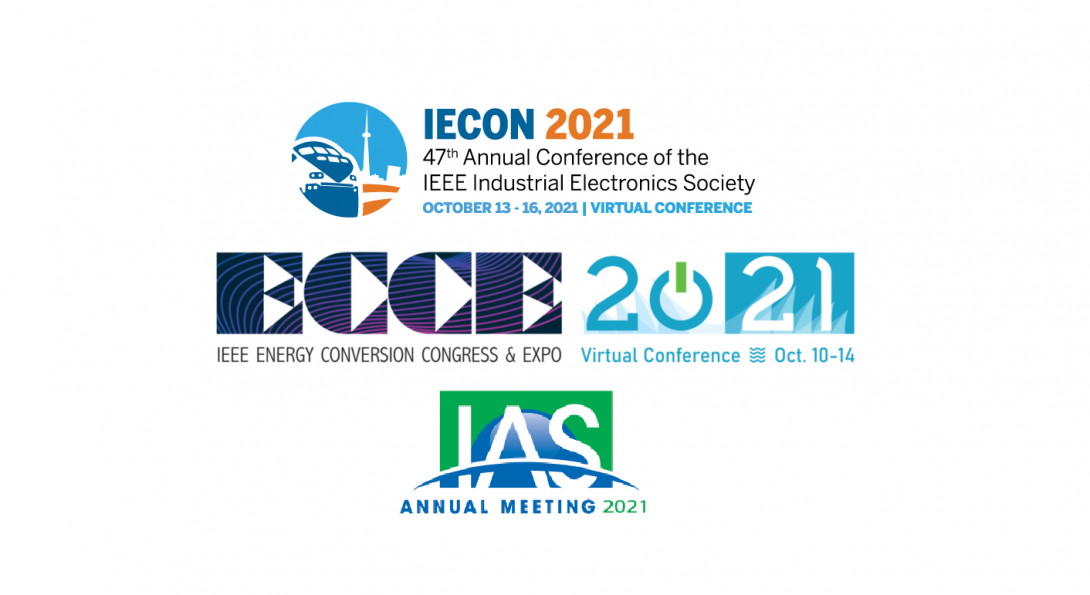
H. Althuwaini, and Mohammad B. Shadmand, “Battery Sources Power Balancing in a Cascaded Multilevel Inverter via an Optimal Moving Horizon Predictive Control,” The 47th Annual Conference of the IEEE Industrial Electronics Society, IECON 2021.
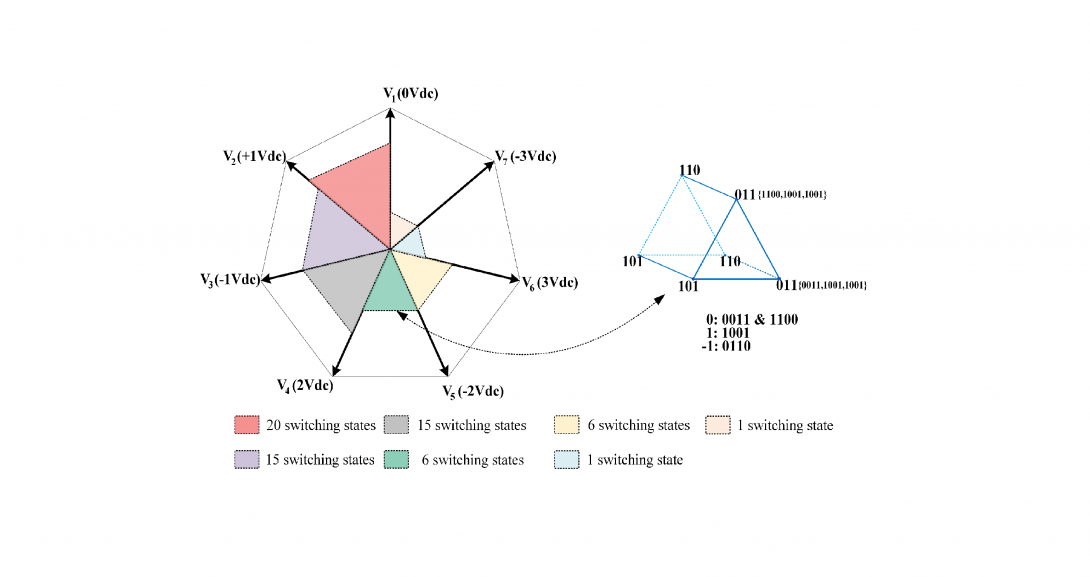
This paper presents an efficient and optimal model predictive control (MPC) scheme for cascaded multilevel inverters (CMI) interfaced with battery sources. One of the major control challenges with CMI is the equal power distribution amongst the cascaded cells. For the application in hand, the unbalance state-of-charge of battery cells due to unequal power drawn from them, will impact the battery lifetime and eventually the reliable operation of the overall system due to uneven stress on CMI cells. The existing classical control schemes for CMI with power balancing capability are suffering from slow dynamic response for power balancing. In addition, they require substantial tuning effort due to their multi-nested loop control structure. On the other hand, conventional MPC schemes demonstrates promising superiority for CMI control comparing to classical control schemes, but they suffer from uneven power distribution among cascaded cells. This paper proposes an optimal moving horizon predictive control scheme for CMI that addresses the challenges associated with classical control and conventional MPC schemes for battery sources interfaced grid interactive CMI. The proposed approach addresses the computational burden of MPC for CMI as number of level increases while ensure equal power drawn from battery cells with fast dynamic response which improves the lifetime of entire system by distributing the stresses on all cells of CMI. The functionality of the proposed approach is evaluated with several case studies.
Shantanu Gupta, Muhammad F. Umar, Mohammad B. Shadmand, and Sudip K. Mazumder, “Self-synchronization Scheme for Network of Grid-following and Grid-forming Photovoltaic Inverters,” The 47th Annual Conference of the IEEE Industrial Electronics Society, IECON 2021.
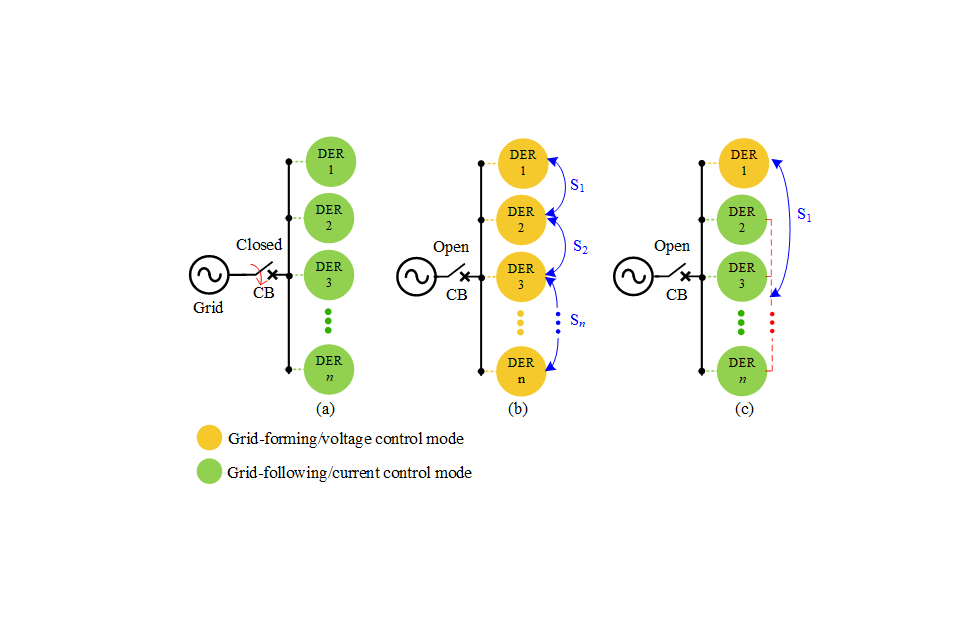
Microgrids in power electronics dominated grid (PEDG) should be able to operate under islanded and grid-connected modes and switch between them seamlessly. During the islanding events severe fluctuations in voltage and frequency of the microgrid may arise that can cause unstable operation and ultimately blackout. Moreover, under this transition the inverter may lose synchronism or point of synchronization because of disconnection from grid. This paper proposes: (i) a predictive control scheme that enables dual-mode (grid-forming and grid-following) operation of inverters and enables seamless transition between these two modes; and (ii) a swift single-point synchronization scheme for the network of grid-following and grid-forming inverters. The proposed control scheme mitigates voltage, current, and frequency fluctuations and enables seamless transition while needing limited time for synchronization between the grid-connected and the islanded modes of operation. Moreover, the predictive controller ensures smooth toggling between grid-following and grid-forming modes of operation and extracting maximum power from photovoltaic energy sources. The effectiveness of the proposed control scheme with its self-synchronization capability is validated by various case studies under grid-tied, islanded and transition from grid-connected to islanded mode of operations.
M. Hosseinzadehtaher, A. Y. Fard, and M. B. Shadmand, “Event-triggered Self-learning Control Scheme For Power Electronics Dominated Grid,” IEEE Energy Conversion Congress and Exposition (ECCE), 2021, Vancouver, BC, Canada.
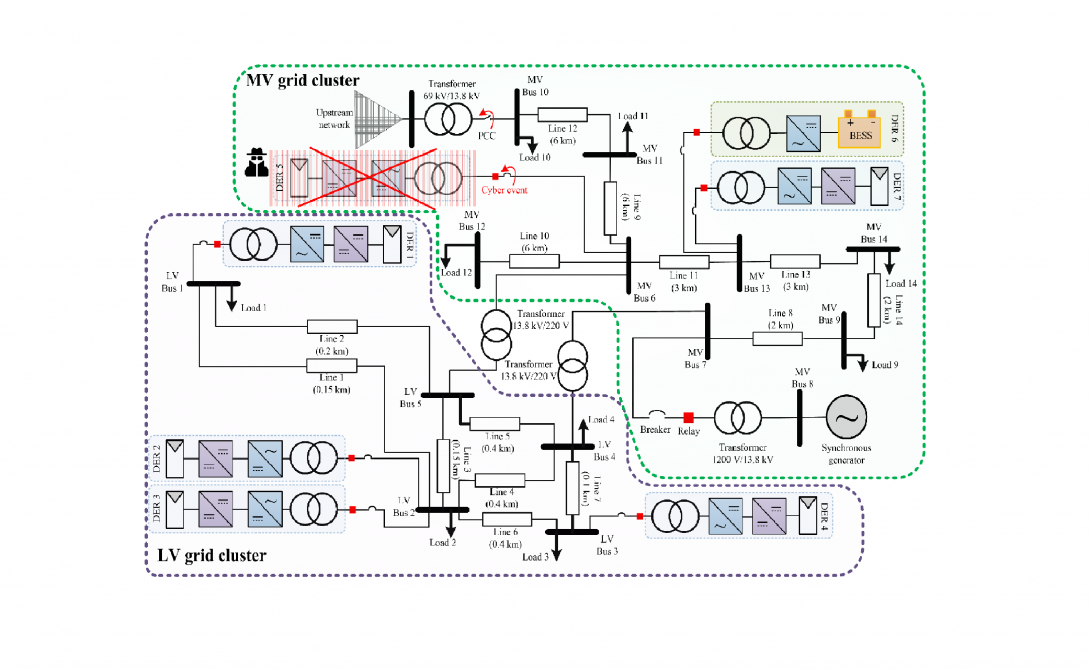
The growing penetration of distributed energy resources (DERs) requires renovation of the conventional power grid into a new paradigm, so-called power electronics dominated grid (PEDG). Alongside the features introduced within this new concept, the PEDG is more prone to cyber-physical malicious activities because of the distributed communication infrastructure and accessibility of the resources. Some of these malicious activities e.g., stealthy attacks, are unobservable for the supervisory system until the control system diverges. Some of these attacks might result in loss of DER generation that could cause frequency deviations beyond permissible boundaries specified by the DERs grid integration standards. To fulfill frequency restoration in the event of stealthy attacks, this paper proposes an artificial-intelligence-based shadow control for inverter-interfaced DERs to improve the grid’s resiliency. During the normal operation of the PEDG, all DERs inject active power considering various criteria including, maximum available power, state of the charge, rate of power reserve, etc. As an unusual deviation on the frequency or its rate of change occurs, the artificial-intelligence-inspired shadow control of the grid cluster is activated to re-balance active power across the grid within a short timeframe while slow-response synchronous generators are trying to catch up. The ANN module of the proposed shadow control provides accurate feedbacks for the DER controller to support the grid frequency for any potential disturbances. The proposed shadow control framework is verified on a 14-bus PEDG system.
A. Khan, M. Hosseinzadehtaher, A. Y. Fard, and M. B. Shadmand, “Active Power Decoupling Control for Rectifiers with Variable Frequency Supply for More Electric Aircraft,” IEEE Industry Applications Society Annual Meeting, 2021, Vancouver, BC, Canada.
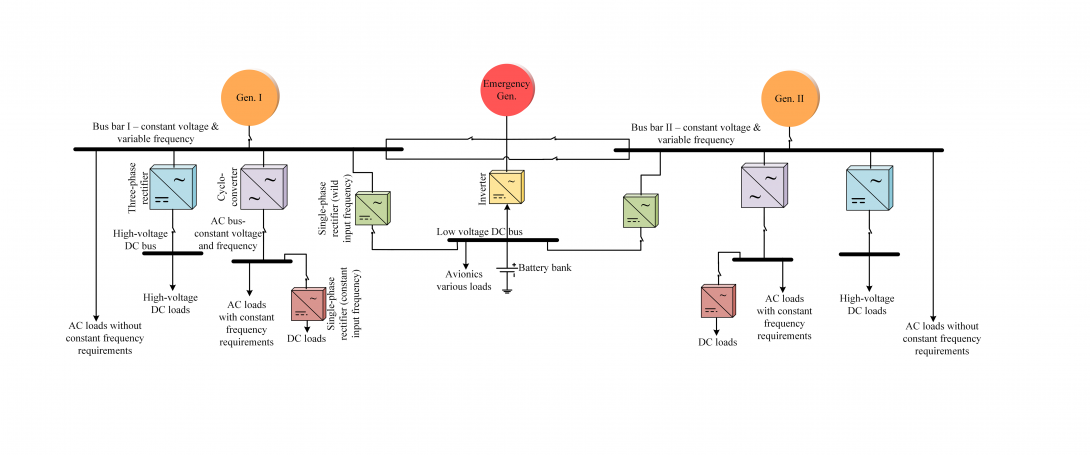
This paper develops a direct decoupled active and reactive power control for active rectifiers operating under variable frequency AC supply. The proposed control is also accompanied with the extension of the conventional fixed frequency active power decoupling control to variable frequency operation. Such variable frequency operation is common for more electric aircraft (MEA) applications. This work is focusing on the DC bus bars that are fed by one of the phases of the three-phase MEA AC bus. In this paper, concepts such as variable frequency second order generalized integrator, and variable frequency proportional resonance controller are introduced. Then, these two concepts are utilized to develop a novel variable frequency linear-time-varying (LTV) multiple output multiple input (MIMO) state-space model and a variable frequency active power decoupling control. The theoretical analyses are verified by simulation of a 20 kVA variable frequency active rectifier with a 50 µF decoupling capacitor.